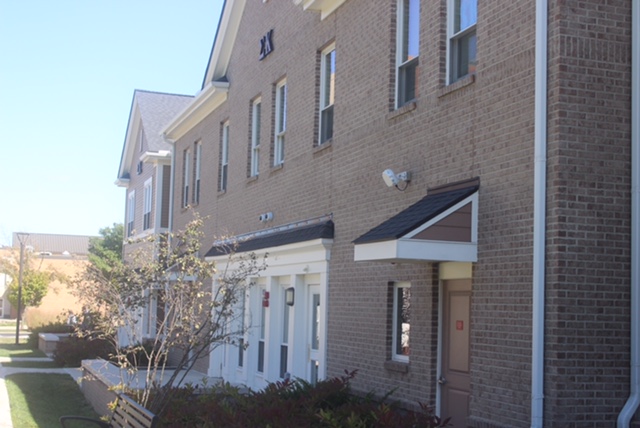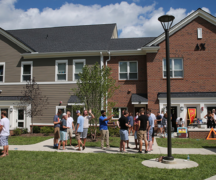By DAVID DUPONT
BG Independent News
Some Greek organizations are facing substantial hits to their finances because they have not been able to fill their houses in the Greek Village.
The Bowling Green State University chapter of Sigma Kappa is facing vacancy fees of more than $33,000 reported their alumni advisor Carly Walter.
Carlton Schooley, an alumni advisor for Sigma Phi Epsilon, said that fraternity is facing vacancy fees of about $40,000.
Chapters just don’t have that much money in their operating budgets to cover the cost, Walter said.
Neither advisor was sure what other Greek chapters have been assessed.
Vice President for Student Affairs Jodi Webb said that such fees have been in place since the 33-unit Greek Village was opened in 2016.
The project, which replaced all sorority and fraternity houses on campus, cost $33million to build. The university borrowed that money, and the debt is being paid off through housing fees and a “parlor fee” which is shared by all members of a chapter whether they live in the house or not. That fee, for example, for Sigma Kappa is $9,000 for an 18-room house. That fee was suspended during the pandemic, but chapters need to pay it for the 2021-2022 academic year.
Walter described a “perfect storm” of issues that has led to the crisis.

In fall, 2020, the administration decided to “de-densify” campus. Students were allowed to live in residence halls, but mostly in singles. To achieve that the university paid students to move off campus, which included Greek housing.
This pushed students off campus including Greek members who would live in the village. Walter said that served as a transition from the residence halls to off-campus apartments.
Walter said the problems began later in the semester when the university announced it would be moving back to fuller occupancy in fall, 2021.
A notice was sent to chapter presidents in late October informing them of this, and that the occupancy rules would be in place. If a house did not fill all it beds, whether they had a four-bed, 12-bed, or 18-bed house, it would be assessed a fee for each vacancy.
Walter and other alumni advisors didn’t get the memo.
The student leaders who did were in the middle of the muddle of having to deal with a variety of COVID protocols.
With students uncertain about what the university would do in fall, many went ahead and signed leases for off-campus housing, Walter said.
“It has literally wiped out the student pool that was able to live in the Greek houses,” Schooley said.
Then in spring, tragedy befell the university. Stone Foltz, a sophomore, died as result of a hazing incident.
At that point, when fraternities and sororities were recruiting new members, the university put a pause on all Greek activities.
In the soul searching that followed the death, one of the recommendations, Walter noted, was more transparency. Yet, she said, the vacancy issue reflects a lack of transparency.
In July, Greek chapters had a week to tell the university if they wanted to keep their houses.
Schooley said Sigma Phi Epsilon was offered a smaller house. But, he said, the fraternity had invested $100,000 upgrading its unit when the Greek Village opened and did not want to risk losing it.
Walter said any decision could not be made because it would require discussion among members that could not be arranged because students were not on campus.
So Sigma Phi Epsilon ended up with eight brothers in the 18-bed house, and Sigma Kappa ended up with seven sisters in their 18-bed house. And both ended up with hefty vacancy bills.
Webb said that seven of the chapters have vacancies, and the charges vary. The university recognizes that for some the debt “is significant.”
“We don’t take that lightly,” she said.
The university has tried to work with chapters in a number of ways. If a chapter could get up to 50 percent occupancy, the university would waive the fees on two beds. Up to 75 percent occupancy, they would waive the fee on three beds. “That’s the first time we have been able to offer that to our chapters to help lessen the financial implications.”
They also have allowed the chapters to bring in non-affiliated students to fill those beds, and allowed those seeking membership to move into the houses, even if their intake is not complete.
The university, Webb said, has offered “a range of things over the last several months. We waited until mid-December to assess any of those charges.”
That would give them some time once they were back on campus to try to fill some of the beds.
“The truth is some were more successful than others. It’s definitely a concern,” she said, noting that Greek organizations vary in many regards, including how they decide who will live in the on-campus house..
The university, Walter said, also encouraged chapters to bring in sophomores as new members since they could move in right away.
First semester freshmen cannot move in, though they could in their second semester.
But neither recruiting non-affiliated students nor sophomores worked for Sigma Kappa, she said.
Schooley wondered if alumni would be willing to bail the Sigma Phi Epsilon chapter.
Both cited the importance of Greek life to the university as a whole.
Greek life offers a good return on investment for the university, Walter said, since these students tend to be more engaged and stay at BGSU through graduation. Now they are “pushing them out by essentially evicting them.”
There seemed to be somewhat less interest in joining a sorority this year, she said. The new rules put in place to address hazing, which call for ongoing training, may also be discouraging students. Some of it seems like “busy work,” she said. As a professional who works with Greek organizations, she questions its effectiveness.
Schooley said many fraternity members take leadership positions both as students and beyond. One Sigma Phi Epsilon alumni, Howard Traul, is a member of the university’s board of trustees.
At a May meeting Traul questioned the policy of allowing first-year students and sophomores to live off campus.
At that time it was announced that there would be more houses vacant in the Greek Village than usual.
There were always a few, Webb said, but this semester eight are not occupied by Greek organizations. The university reserved one for students who have COVID-19 to isolate. The others were open for housing non-Greek affiliated students.
Webb said: “We’re always concerned about the viability of the organizations. …We will continue to work with the groups.” If they can bring students in “we would look at reducing that amount based on when they move in.”
The viability of Greek life is “absolutely a concern,” Webb said.
“We’re very committed to having a vibrant group community. We think the Greek village is an important part of our campus and we want to see our groups be successful.”



